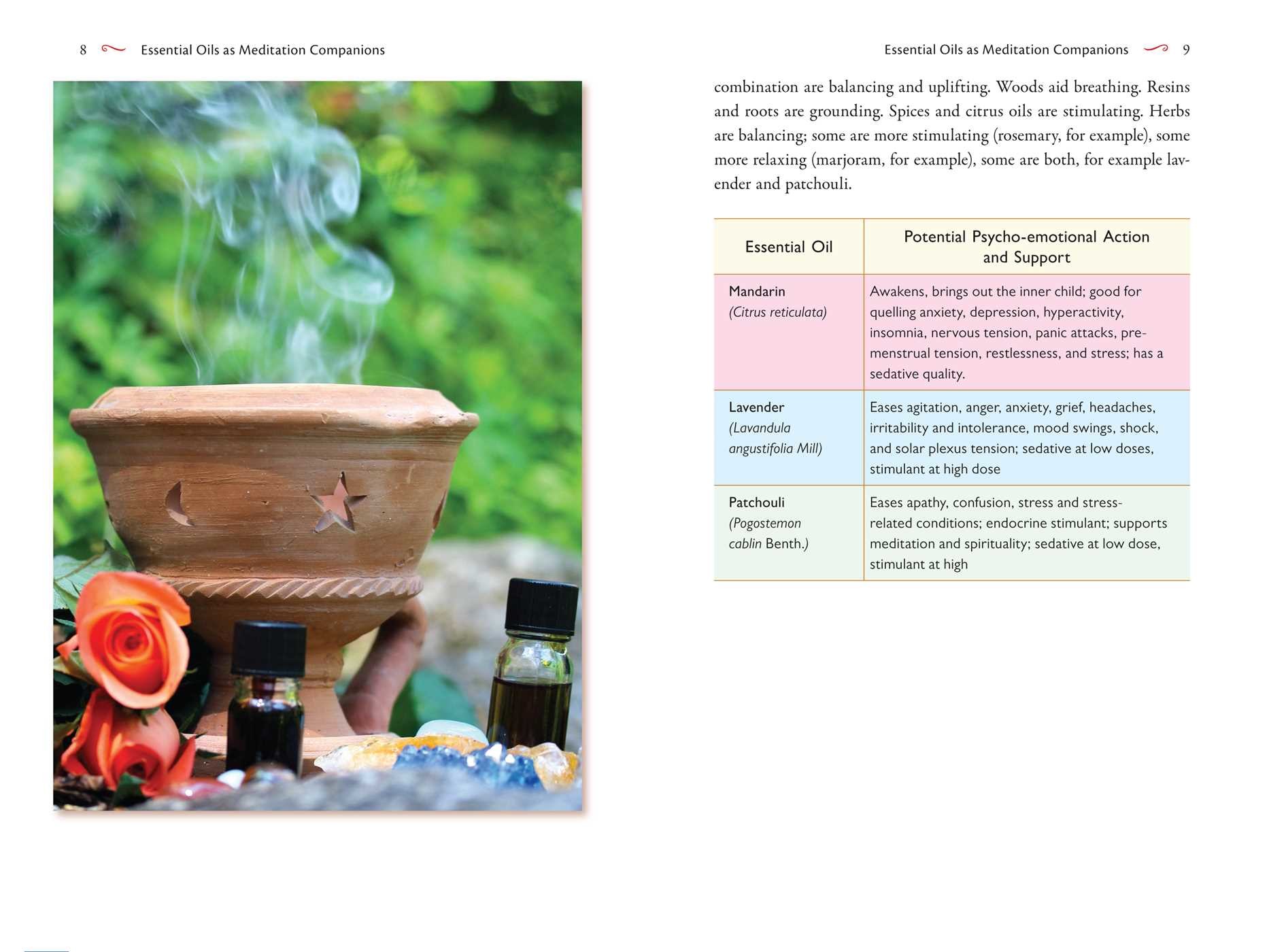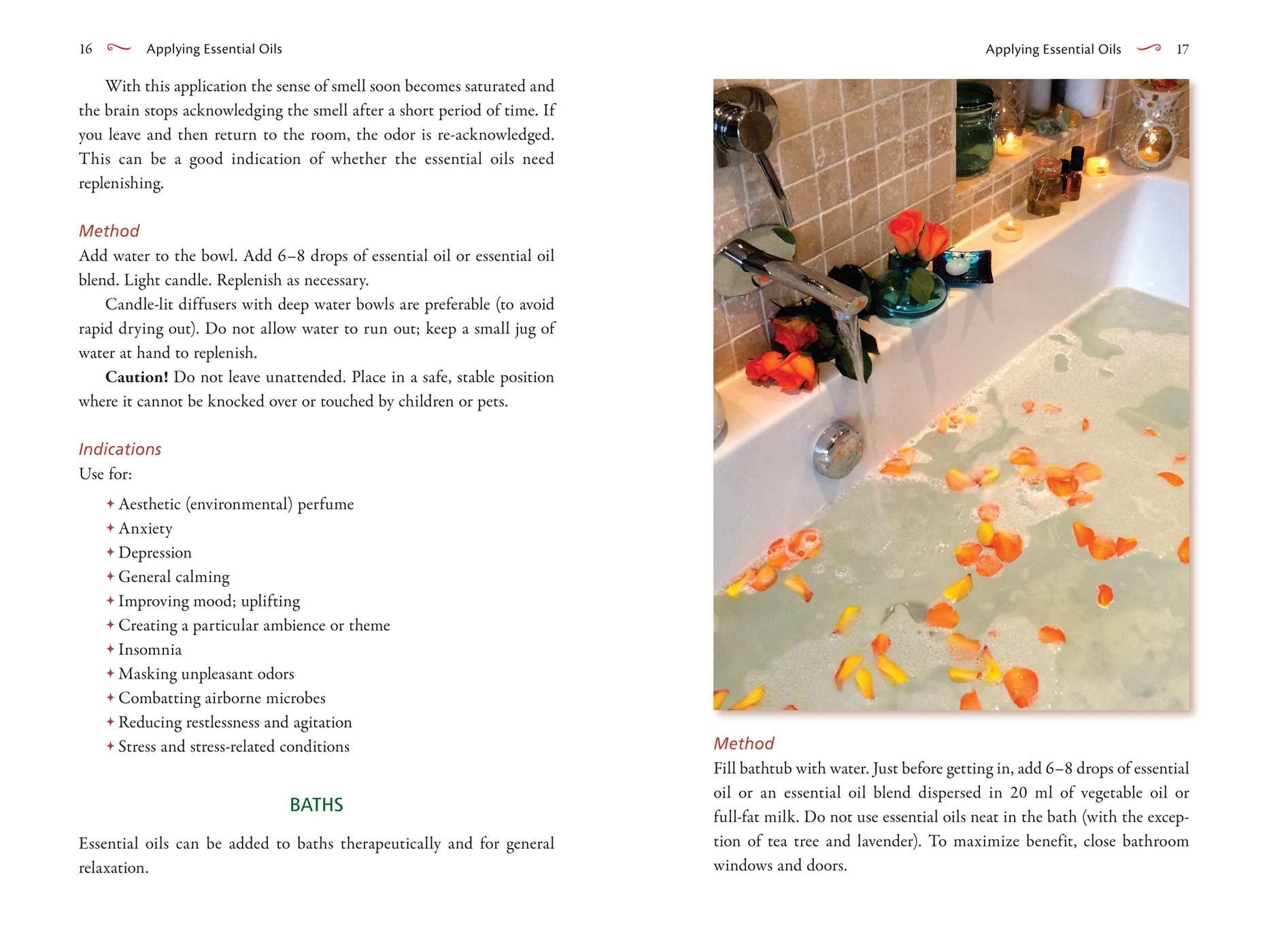Get our latest book recommendations, author news, and competitions right to your inbox.
Essential Oils for Mindfulness and Meditation
Relax, Replenish, and Rejuvenate
Table of Contents
About The Book
• Details safe and effective methods to incorporate essential oils into your mindfulness or meditation practice
• Explains the many ways essential oils benefit the mind, such as how odors can immediately draw your attention to the present moment, trigger a specific state of consciousness, or provide a way to regain composure quickly
• Provides the latest scientific research on the emotional, psychological, physiological, and neurological effects of essential oils on the mind, body, and nervous system
• Includes an easy-to-follow chart to help you choose the right essential oil for you
For millennia, the spiritual power of odor--such as from incense or frankincense--has been used to symbolize intention, stimulate awareness of our spiritual self, and accentuate rite and ritual. Drawing on this power, as well as their healing qualities, essential oils can provide the perfect complement to meditation or mindfulness practice.
Outlining the practice and benefits of meditation and mindfulness in combination with the use of essential oils, Heather Dawn Godfrey explains how these practices hone and sustain a conscious awareness of “being” in the present moment, focusing attention on what you are sensually experiencing and leaving no space for regrets, traumas, fears, anxiety, or anticipation. Providing the latest scientific research on the restorative, rehabilitative, and psycho-emotional healing effects of essential oils, she explains how the sensory experience of odors can immediately draw your attention to the present moment, trigger a specific state of consciousness, such as a deeper meditative state, or offer a way to regain composure quickly when dealing with life’s ups and downs. She shows how many essential oils naturally reduce stress and anxiety, promote a peaceful attitude, support concentration, regulate breathing, and stimulate serotonin and GABA pathways in the brain, making them ideal aids to mindfulness and meditation.
Explaining methods to incorporate essential oils into your practice, Godfrey introduces readers to the “Gem” essential oils--a group of oils specifically selected for attaining and maintaining a state of mindfulness, as well as a broad spectrum of therapeutic properties--and she provides an easy-to-follow chart to help you select the oil that is right for you. Offering a hands-on practical guide to integrating essential oils into mindful and meditative practice, the author shows how each of us has the ability to self-generate a calm, tranquil, and worry-free state of mind.
Excerpt
Essential Oils as Meditation Companions: The Science of Their Use
Essential oils possess numerous qualities that can support and enhance wellness and a sense of well-being. They may improve mental clarity and concentration, instill a sense of feeling calm and uplifted, energized and awake. They are perfect meditation companions.
What Is an Essential Oil?
Essential oils are highly concentrated, volatile, odiferous phytochemical derivatives extracted from various parts of certain plants, trees, and shrubs: for example, rhizomes and roots, stems, leaves, flowering heads, seeds, wood (stumps, trunks, heartwood, sawdust), twigs, bark, resin, needles, berries, blossoms, fruit, rind, and grass. Not all plants produce essential oils. According to Tisserand and Young (2014) and Lawrence (1995), there are an estimated 350,000 plant species existent throughout the world, of which just 17,500 (5%) are aromatic. Yet just 400 of these aromatic species surrender essential oils suitable for commercial use. Half of these are specifically cultivated for their essential oil while others are grown, managed, and harvested in the wild. Many essential oils are produced as a by-product of industry (for example, citrus oils are produced for the food, manufacturing, and perfume industries).
How Does the Brain Respond to Essential Oils?
The brain is responsive to external sensory input and neurological stimulation and facilitates internal homeostasis, environmental awareness, consciousness of a deeper sense of being, and relationships with other people and the external world. Fragrance detection triggers numerous neurological, physiological, emotional, and hedonistic responses at the same time, which are difficult to disentangle. While it may be difficult to prove or explain specifically how essential oils affect the brain, numerous studies demonstrate that their vaporizing odorous molecules do instigate neurological responses that appear to affect mood, emotion, memory, concentration, and cognition (either via inhalation or circulatory absorption), even if this influence is temporary.
Studies using animals, such as mice, although ethically controversial, eliminate many potentially influential subjective psycho-emotional variables when exploring the basic physiological and behavioral effects of essential oils, and provide very useful indications. However, these studies do not completely reflect the real complexities of true life scenarios when applied to humans, where the idiosyncratic psycho-emotional and hedonistic responses to essential oils contribute to the outcome of their actions--and/or, for that matter, conversely, the complex influence essential oils actually have on the individual’s psyche, cognition, and physiological function.
Memory
Odor memory is more tenacious than other senses (sight, sound, touch, hearing). Memory is reinforced, enhanced, and may last or linger longer where multiple sensory stimulation occurs at the same time, especially when less consciously controlled cognitive processes, which do not involve judgment, deliberation, reasoning, or rational evaluation, are being performed--for example, creative tasks, learning performing by rote, etc. (this works the same for negative and positive experiences). Thus, activities such as massage, meditation, visualization, or relaxation techniques may be positively enhanced and experientially memorably reinforced when complementary essential oils are vaporized at the same time. Herz et al (2000) applied odor in connection with pleasant and unpleasant circumstances to examine the effect of odor on memory, finding that “memories elicited by odors are more emotionally potent than memories evoked by other sensory stimuli, and when salient emotion is experienced during odor exposure, the effectiveness of an odor memory cue is enhanced.” Pitman (2000) exploited this salient connection between odor and memory to help hyperactive children manage their restlessness, using visualization and self-massage during exposure to selected essential oils to instill a sense of calmness and peace that could be recalled and experienced later when deliberately inhaling the odor of the same essential oil(s) as a memory cue. Pitman observed that, “it was very noticeable 4 that both the oils and the relaxation improved concentration. Students definitely stayed calmer longer and recovered quickly from upsets. There were fewer disruptions to lessons.”
Primary Cephalic Actions Supported by Essential Oils
Sedative / Calming
Stimulant / Uplifting
Balance of the central nervous system
Subjective Terms Used to Describe the Psycho-emotional Effects of Essential Oils
Calming
Balancing
Invigorating
Bracing
Restorative
Refreshing
Grounding
Strengthening
Warming
Uplifting
Essential Oils and Meditation
Essential oils can be used prior to meditation as part of your preparation process (perhaps in a bath, in an oil blend to be applied in self-massage, or simply environmentally vaporized in a diffuser). They can be used during meditation to aid concentration, focus, and alertness, and to calm racing thoughts and ease restlessness (perhaps applied as a personal perfume or, again, diffused into the atmosphere). Following meditation, essential oils can be used as a memory cue, a gentle reminder to return attention to the here and now. Their physiological and psycho-emotional uplifting, grounding, and balancing qualities are also beneficial at this time.
Your selection of essential oils will be personal and pertinent to you and what you require or need; there is not a “perfect blend” in this context, only the one that works best for you at any given moment in time. Your own nose will help you discover the alchemist within; your instinct is a good starting point.
As a very general guide to get you started, woods and tree resins, roots and rose blossom feature among the traditional scents employed to support meditation and prayer. Woods and flowers/blossoms in combination are balancing and uplifting. Woods aid breathing. Resins and roots are grounding. Spices and citrus oils are stimulating. Herbs are balancing; some are more stimulating (rosemary, for example), some more relaxing (marjoram, for example), some are both, for example lavender and patchouli.
Product Details
- Publisher: Healing Arts Press (June 3, 2019)
- Length: 160 pages
- ISBN13: 9781620557624
Raves and Reviews
“There is a unique way to enhance psychological well-being waiting to be explored. This book tells you how meditation and aromatherapy, classic tools for modifying the mind, can work together to maintain a state of calm and insight. Familiar oils like rose and frankincense add serenity and inspiration to the practice of mindfulness meditation. Diffusing an essential oil during meditation practice can even return your awareness to that meditative mode if you smell the aromatic oil again later.
The author is an aromatherapist who not only uses essential oils professionally but also conducts research into the effects of these powerful plant ingredients. The reader will find out how knowledge of traditional practice and subjective experience, backed by scientific evidence, is an ideal path for discovery; how mindfulness meditation and essential oil inhalation relieve anxiety or calm the mind, as explained from the perspectives of ancient history, religious practices, and modern complementary medical practice. Scientific studies involving human subjects and essential oils tested in laboratory models are described in easy-to-digest detail that adds value and validity.
Advice on how to use the pure essential oils comes with a thorough briefing on dose and safety--a prerequisite for these concentrated and potent plant extracts. In passing, learning about the many everyday food, drink, and cosmetic products that contain essential oils is an eye-opener on the hidden influences on the mind and body. This book is bound to have a long-lasting impact on both meditation and aromatherapy practices, thanks to its inspired author, Heather Dawn Godfrey.”
– Elaine Perry, Ph.D., professor emeritus of neuroscience at Newcastle University
“Essential Oils for Mindfulness and Meditation fills an important gap in the field of essential oils. Where many other books are contented with the properties and the handling of oils, Heather Godfrey provides us with a profound scientific background of the different oils and opens up the field toward awareness and meditation. This book is a wonderful guide to using essential oils as valuable helpers for everyday life, as a source of knowledge for well-being professionals, and for a deeper understanding of oneself and nature.”
– Ewald Kliegel, author of Crystal Wands and Holistic Reflexology
“This interesting book melds the science and alchemy of essential oils and their use in meditation with a mix of personal anecdotes and evidence. Taking the reader on a journey through these highly topical disciplines, it is a timely reminder and how-to guide of the importance of stepping back from the maelstrom of modern life to find a sensible inner balance.”
– Sophie [Petit-Zeman] Olszowski, Ph.D., Director of SPZ Associates LTD.
Godfrey, an International Federation of Aromatherapists fellow, skillfully explains how scent works on the brain to create relaxation and how this affects our well-being. Odors that stimulate brain chemicals, such as serotonin and GABA, trigger composure, concentration, deep breathing, and a meditative state to reduce stress and anxiety. Research is presented on rehabilitative techniques to remove negative emotional states, like regrets, traumas, fears, and anxiety. Charts and discussion show the brain’s hemispheres and the actions of a few essential oils are mentioned, although no recipes are suggested. There are also guidelines for use, healthy foods, and methods, techniques, and tools for application.
– American Herb Association Quarterly
Resources and Downloads
High Resolution Images
- Book Cover Image (jpg): Essential Oils for Mindfulness and Meditation Trade Paperback 9781620557624












